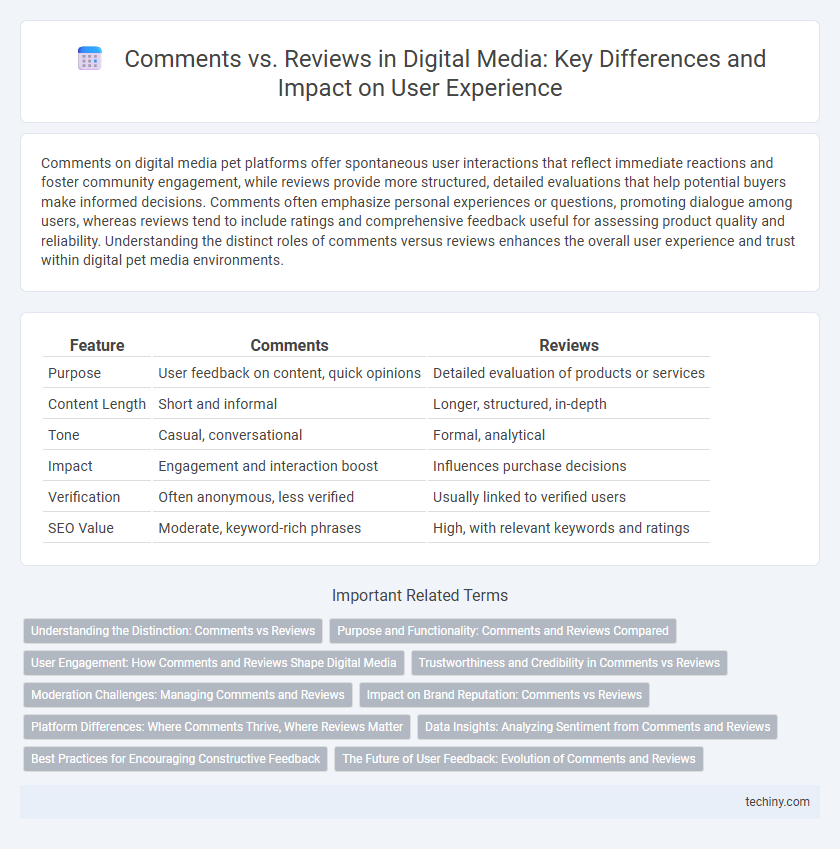Comments on digital media pet platforms offer spontaneous user interactions that reflect immediate reactions and foster community engagement, while reviews provide more structured, detailed evaluations that help potential buyers make informed decisions. Comments often emphasize personal experiences or questions, promoting dialogue among users, whereas reviews tend to include ratings and comprehensive feedback useful for assessing product quality and reliability. Understanding the distinct roles of comments versus reviews enhances the overall user experience and trust within digital pet media environments.
Table of Comparison
| Feature | Comments | Reviews |
|---|---|---|
| Purpose | User feedback on content, quick opinions | Detailed evaluation of products or services |
| Content Length | Short and informal | Longer, structured, in-depth |
| Tone | Casual, conversational | Formal, analytical |
| Impact | Engagement and interaction boost | Influences purchase decisions |
| Verification | Often anonymous, less verified | Usually linked to verified users |
| SEO Value | Moderate, keyword-rich phrases | High, with relevant keywords and ratings |
Understanding the Distinction: Comments vs Reviews
Comments offer brief, informal feedback or opinions typically found on social media posts, blogs, and videos, often reflecting immediate reactions or personal thoughts. Reviews provide structured, detailed evaluations usually associated with products, services, or media, incorporating ratings, pros and cons, and user experience insights. Understanding the distinction between comments and reviews helps businesses and content creators effectively analyze consumer sentiment and improve digital engagement strategies.
Purpose and Functionality: Comments and Reviews Compared
Comments serve as user-generated feedback typically positioned for informal interaction, offering immediate responses and fostering engagement on digital media platforms. Reviews provide structured evaluations focused on assessing quality or performance, often influencing potential consumers through detailed analysis and star ratings. Both formats contribute to online credibility, but reviews carry more weight in decision-making processes due to their comprehensive nature and standardized criteria.
User Engagement: How Comments and Reviews Shape Digital Media
Comments foster immediate user interaction by allowing spontaneous opinions and discussions, enhancing real-time engagement on digital media platforms. Reviews provide structured feedback with detailed assessments that influence consumer decisions and build trust over time. Together, comments and reviews create a dynamic ecosystem that drives user participation and enriches content credibility in digital media.
Trustworthiness and Credibility in Comments vs Reviews
Comments often reflect immediate user reactions and personal experiences, making them subjective but valuable for real-time feedback. Reviews typically undergo more thorough evaluation, offering structured insights with ratings that enhance their trustworthiness and credibility. The credibility of reviews is further reinforced by detailed assessments and verification processes, which comments may lack.
Moderation Challenges: Managing Comments and Reviews
Moderation challenges in digital media revolve around filtering spam, abusive language, and fake content in user-generated comments and reviews. Effective moderation systems employ AI-powered algorithms and human oversight to ensure authenticity while maintaining user engagement. Balancing transparency, user privacy, and community guidelines remains critical for preserving platform trust and content quality.
Impact on Brand Reputation: Comments vs Reviews
Comments offer real-time, organic feedback that can quickly shape public perception, often reflecting immediate customer sentiment and engagement. Reviews provide detailed, structured evaluations that influence potential buyers by establishing credibility and trust through comprehensive user experiences. Both comments and reviews significantly impact brand reputation, with reviews generally holding greater weight in long-term brand authority and consumer decision-making.
Platform Differences: Where Comments Thrive, Where Reviews Matter
Comments thrive on social media platforms like Facebook, Instagram, and YouTube, where real-time interaction and conversational engagement drive user participation and community building. Reviews hold greater significance on e-commerce sites such as Amazon, Yelp, and TripAdvisor, where detailed evaluations influence purchasing decisions and brand reputation. Each platform's unique structure and user intent shape the effectiveness and impact of comments versus reviews in digital media ecosystems.
Data Insights: Analyzing Sentiment from Comments and Reviews
Sentiment analysis of comments reveals real-time consumer emotions and spontaneous reactions, offering granular insights into user engagement and preferences. Reviews provide structured feedback with detailed evaluations, enabling trend identification and product performance assessment over time. Combining data from both sources enhances predictive accuracy for market strategies and improves customer experience optimization.
Best Practices for Encouraging Constructive Feedback
Encouraging constructive feedback in digital media requires clear guidelines that differentiate comments from reviews, emphasizing respect and relevance. Implementing moderation tools and prompting users to provide specific insights or ratings enhances the quality of interactions. Platforms that foster open dialogue while minimizing spam and negativity significantly improve audience engagement and trust.
The Future of User Feedback: Evolution of Comments and Reviews
User feedback is rapidly evolving as digital media platforms integrate AI-driven sentiment analysis to enhance the depth and relevance of comments and reviews. Emerging features like real-time moderation and personalized response suggestions improve engagement quality while reducing misinformation. The future of comments and reviews lies in combining structured metadata with emotional intelligence, enabling brands to gain actionable insights and foster authentic community interactions.
Comments vs Reviews Infographic

 techiny.com
techiny.com